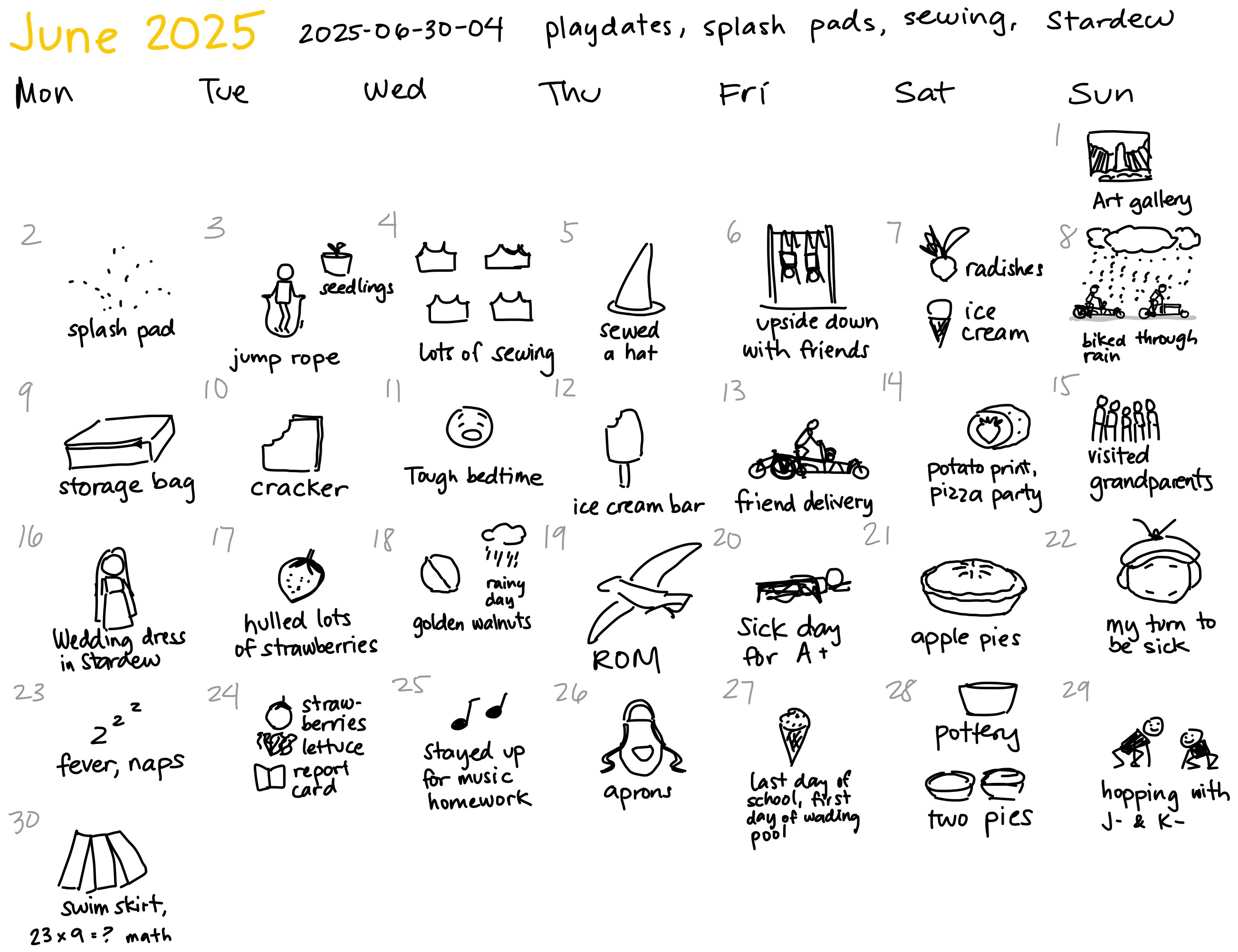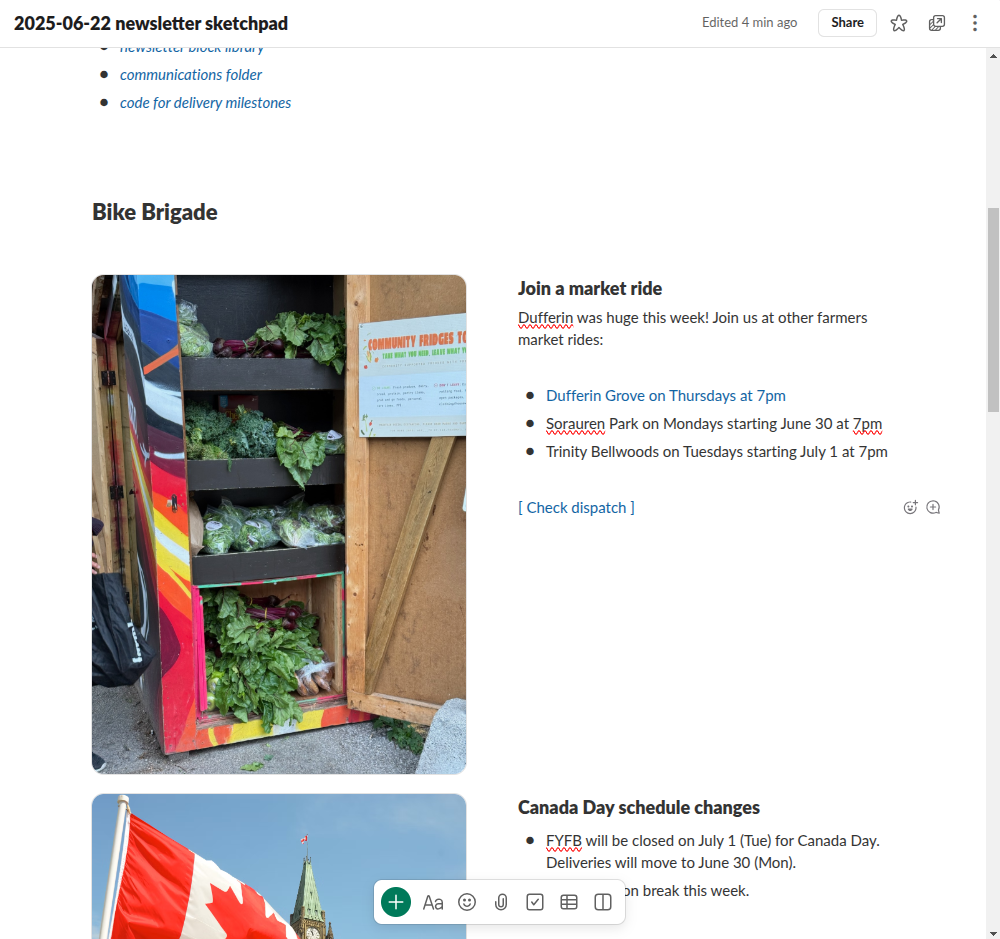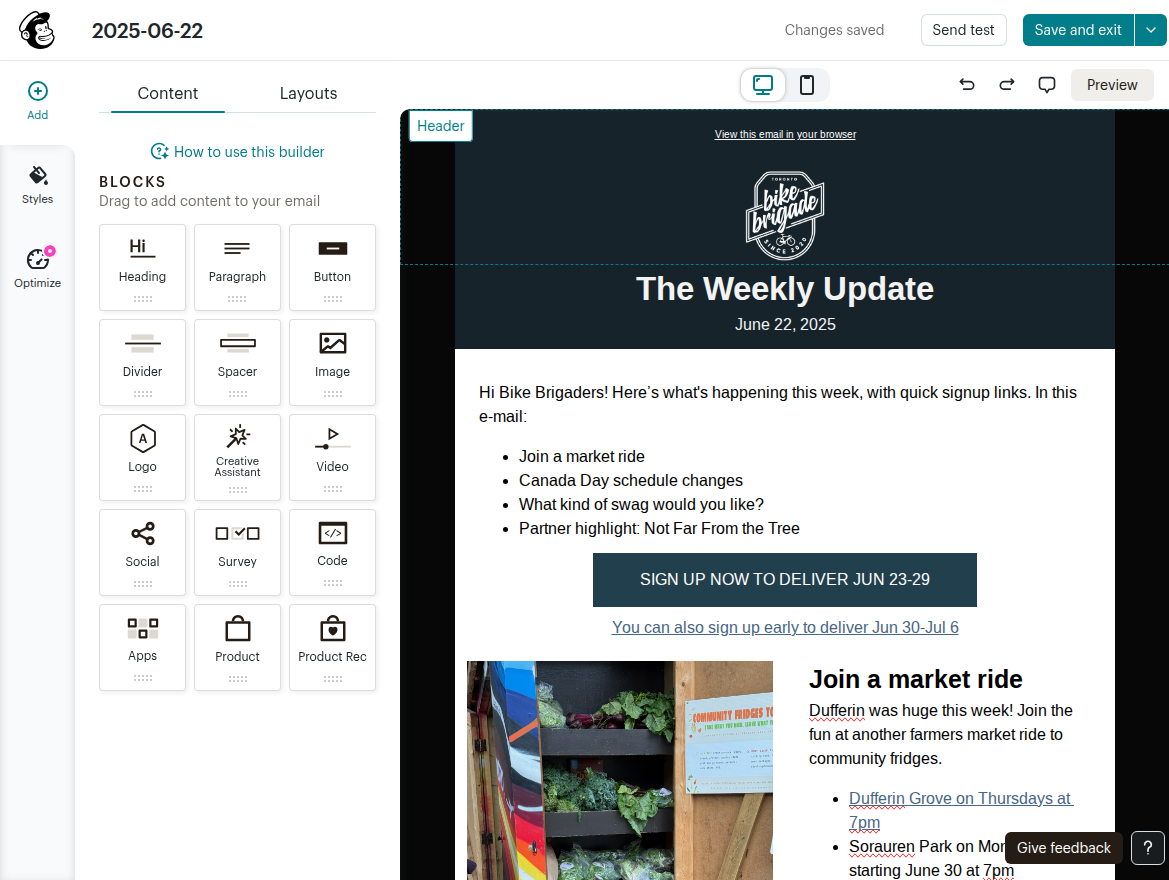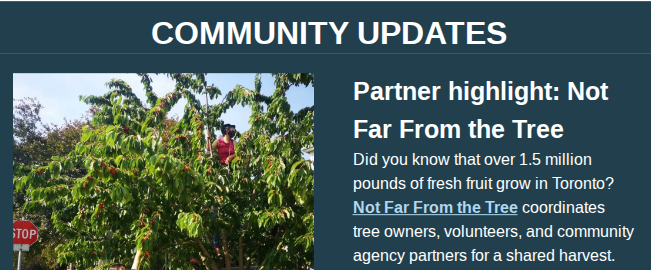June 2025: playdates, splash pads, sewing, Stardew
| monthly, review
Text from sketch
June 2025 2025-06-30-04 playdates, splash pads, sewing, Stardew
- 🖼️ art gallery
- 💦 splash pad
- 🪴 jump rope, seedlings
- 🪡 lots of sewing
- 🪡 sewed a hat
- 🙃 upside down with friends
- 🍦 radishes, ice cream
- 🚲 biked through rain
- 🪡 storage bag
- 🍪 cracker
- 😴 tough bedtime
- 🍦 ice cream bar
- 🚲 friend delivery
- 🥔 potato print, pizza party
- 👴 visited grandparents
- 👰 wedding dress in Stardew
- 🍓 hulled lots of strawberries
- 🌧️ rainy day, golden walnuts
- 🦕 ROM
- 🌡 sick day for A+
- 🥧 apple pies
- 😷 my turn to be sick
- 🌡 fever, naps
- 🍓 strawberries, lettuce, report card
- 🎵 stayed up for music homework
- 🪡 aprons
- 🏊 last day of school, first day of wading pool
- 🏺 pottery, two pies
- 🐸 hopping with J- & K-
- 🪡 swim skirt, 23x9= math
A+ finished virtual grade 3 and is now on summer break. I let her decide between mostly structured and mostly unstructured time. She picked mostly unstructured time, with one set of private swimming lessons at an outdoor pool and one week-long afternoon summer camp focused on pottery wheels. The rest of the time is for hanging out at splash pads, wading pools, and swimming pools, often with A+'s friends. When it's too hot even for that, we stay inside. There haven't been as many "I'm booored!"s as I expected. I think dealing with school gave her a lot of practice in managing boredom and coming up with her own activities, which is fantastic. It's important to be able to check in with herself and figure out what she's curious about, what she wants to do, and to know that she can come up with that instead of needing someone else to direct her day. Sometimes A+ uses Claude to help her write stories, sometimes she builds LEGO, sometimes she plays Minecraft or Stardew Valley, and sometimes she watches Clone Wars. Sometimes we tag along on W-'s Bike Brigade deliveries, so that's nice. Sometimes she helps me with sewing by doing straight seams, winding the bobbin, or threading the needle. She's been cubing again, packing a 3x3 Rubik's cube when she thinks there might be some waiting time. I still have the timer app on my phone, so she can check how she's doing. This feels like a good kind of busy: not externally imposed, but intrinsically motivated. Not regimented, but going with the flow.
A+ has lots of ideas for things to sew based on things she wants to wear or use, and is very much into having us both wear matching outfits. It turns out that I fit into kid-sized Crocs, so it's easy to get matching colours there too. The pendulum of childhood, I guess. We're currently on the "let's match" side, and then we'll swing over to individuation, and then we'll swing back, and then further out to individuation, and so on. I love that we can explore this through our clothes, shoes, and interests. Some days she wants to be just like me, and almost physically tries to occupy the same space. (Cuddles are great! I know this opportunity is time-limited.) Other days she grumps at me and nothing I say is right. It's great to be able to not take it personally. It's all part of healthy development.
We're making quick progress through my fabric stash. I've been making clothes: mostly training bras, skorts, and swim skirts out of Spandex so that we can wear it straight into the pool and out again. I've even been able to make a few clothes for me instead of just for her. I used godets to turn last year's swim skirt for A+ into a swim skirt for me, and I added in-seam pockets. Pockets are great for stashing goggles, glasses, and diving toys. I want pockets in everything now. It's nice getting the hang of more of these little techniques, especially since it means I can turn more scraps and outgrown clothes into new things. I sewed a large zippered liner for W-'s drawer so that we could protect out-of-season wool clothes and blankets from moths. I used the leftover canvas to make a bag for A+ so that she could shop for snacks independently, since the reusable bags from the store dragged on the ground when she held them in her hand. This one is just the right size. It's great to be able to make things that fit. I also made aprons for her and one of her friends, whom we treated to a pottery class. A+ enjoyed potato-printing her bag and apron at the Bike Brigade x Not Far From the Tree pizza party at the park, which was a lot of fun. It might be interesting to pick up more paintable/dyeable fabric and some fabric paint so that we can make our own designs.
A+ was briefly sick with a fever, and then I had a sore throat and a fever too. Now no one has a fever, but I still have a persistent cough. We think we might have picked something up at the party. Even though it was outdoors it was a bit crowded, lots of people were talking, and we hadn't worn our masks. Oh well, just gotta do better next time and mask up at big events. At least I'm still testing negative for COVID. I'm masking at home so that W- doesn't get sick, and generally taking it easy. We got a membership for the ROM, but the annoyance of this cough is making me extra grumpy about crowds and indoor things, so it might be a while before we're back. Plenty to do outdoors now that the weather is warm and her friends play outside.
I probably should sleep more, but I've been staying up to play Stardew Valley, which you'd be able to tell from my time records. I like the game. Even the kiddo is learning to slow down and take care of her farm. Sometimes we play co-op, and sometimes we work on our own playthroughs. I have a fairly built-up standard farm playthrough where I let A+ take over Ginger Island. I'm proud of how I successfully didn't grump when she decided to rip up most of my starfruit plants there and then ended up not replacing them with anything. Not even a blip of grumpiness. I already had more money than I felt like spending, thanks to the ancient fruit winery I'd set up. Aside from cooking and puttering around with the sewing machine, A+ also liked giving my character relationship advice. She encouraged me to marry Emily, pronouncing her the most compatible. (She married Elliott in her own playthrough.) After I gave Emily the mermaid pendant and came back to the farmhouse, A+ had set up a mannequin with a full wedding outfit as a gift for me. She was proud of gathering all the materials needed and sewing the virtual outfit herself. I love that the sandbox nature of the game lets her come up with her own ideas and make things happen.
I also have a four corners farm with remixed bundles where I've just completed the community centre and I'm now slowly collecting hardwood for the boat to Ginger Island. I've developed an appreciation for the fishing minigame that I used to avoid. It's a great way to get treasure. Anyway, Stardew is a pleasant enough way to spend little bits of time here and there, and to relax after A+'s bedtime. It's encouraging to see that I could actually find plenty of discretionary time in my day for playing, and I can use that time for other things once this hyperfocus passes.
Our real-life garden is doing all right, too. Most of the remaining radishes have bolted, although some of the larger ones are still growing well. In spring I gave A+ a bunch of seed packets and let her plant entirely at her own discretion. I've been having fun figuring out how to identify and manage the results, thinning out the ones that are definitely not what we're looking for in that space or that just need a little more spacing. We get a lot of volunteer tomatoes, perilla, goosefoot, wood sorrel, and clover. I've been putting those in the compost to make room for the marigolds and poppies that I recognize from the seed packet pictures. I'm learning to identify other plants as they grow. It's fun letting A+ try whatever she likes and then figuring out how to work with that. It's also fun blending the real-life world and the virtual world. We make the sound effect from Stardew Valley when we uproot our radishes and hold them up above our heads.
Taking advantage of those last days of predictable focus time while virtual school was in session, I got the ball rolling for EmacsConf 2025 with the call for participation. I also enjoyed attending the virtual Emacs Berlin meetup and taking notes. I wrote a bunch of blog posts, too.
We'll see how my focused time settles down now that we're on summer schedule. It turns out that I still have plenty of free time. The daytime part is just more interruptible now because I want to be ready to do something with A+ or head out the door when A+ expresses an interest in going to a playdate or a pool. I still want to get my own stuff done instead of feeling like I'm on standby, so it's great that my notes make it easier for me to make progress in stop-and-go segments. I want her to feel like I'm happy to spend time with her instead of being distracted by an interrupted task. I also want her to see how I choose things to do with my time and how I use notes to help me work around the limitations of my brain and my attention. It's an interesting challenge balancing between occupation and flexibility. I want her to enjoy unstructured time and to be able to shift between solo interests and shared time according to the rhythms of her energy.
July is probably going to be about hanging out with A+ near some kind of water. I like this approach of trusting her to manage her time and attention, letting her take the initiative when it comes to going out and playing with friends or swimming in the pool. In the meantime, there's time for me to write and play.
Blog posts
- Emacs:
- Working on the plumbing in a small web community
- Using Org Mode, Emacs Lisp, and TRAMP to parse meetup calendar entries and generate a crontab
- Run source blocks in an Org Mode subtree by custom ID
- Transforming HTML clipboard contents with Emacs to smooth out Mailchimp annoyances: dates, images, comments, colours
- Thinking about time travel with the Emacs text editor, Org Mode, and backups
- Life:
- Emacs News:
Sketches
Time
| Category | Previous month % | This month % | Diff % | h/wk | Diff h/wk |
|---|---|---|---|---|---|
| Discretionary - Play | 3.7 | 14.6 | 10.9 | 23.7 | 18.2 |
| Discretionary - Productive | 12.5 | 14.8 | 2.3 | 24.0 | 3.8 |
| Personal | 10.7 | 11.5 | 0.8 | 18.7 | 1.4 |
| Discretionary - Family | 0.2 | 0.3 | 0.1 | 0.5 | 0.2 |
| Business | 2.0 | 0.9 | -1.1 | 1.4 | -1.9 |
| Unpaid work | 5.7 | 4.5 | -1.2 | 7.3 | -2.0 |
| Sleep | 31.3 | 27.3 | -4.0 | 44.3 | -6.7 |
| A+ | 33.9 | 26.3 | -7.7 | 42.7 | -12.9 |










